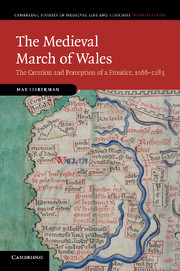Book contents
- Frontmatter
- Contents
- List of maps
- List of tables and illustration
- Preface
- List of abbreviations
- INTRODUCTION
- 1 A BORDER REGION?
- 2 THE MAKING OF A BORDER ARISTOCRACY
- 3 WARFARE AND DIPLOMACY
- 4 THE EXTENT AND NATURE OF THE MILITARY FRONTIER
- 5 THE MILITARIZATION OF SOCIETY
- 6 THE SHAPING OF ADMINISTRATIVE TERRITORIES
- 7 THE BORDER LORDSHIPS AND THE ENGLISH STATE
- CONCLUSION
- Select bibliography
- Index
7 - THE BORDER LORDSHIPS AND THE ENGLISH STATE
Published online by Cambridge University Press: 06 July 2010
- Frontmatter
- Contents
- List of maps
- List of tables and illustration
- Preface
- List of abbreviations
- INTRODUCTION
- 1 A BORDER REGION?
- 2 THE MAKING OF A BORDER ARISTOCRACY
- 3 WARFARE AND DIPLOMACY
- 4 THE EXTENT AND NATURE OF THE MILITARY FRONTIER
- 5 THE MILITARIZATION OF SOCIETY
- 6 THE SHAPING OF ADMINISTRATIVE TERRITORIES
- 7 THE BORDER LORDSHIPS AND THE ENGLISH STATE
- CONCLUSION
- Select bibliography
- Index
Summary
Towards the end of the period under consideration, the distinctiveness of the lordships of the ‘March’ had already become a matter for debate. It was argued above that the barones Marchie formed an identifiable group in various respects, and that their honors overlapped with a cultural and strategic borderland. However, when their lordships came to be perceived more clearly as a special category of seigneurial estate, it was not primarily because they lay on an ethnic and military frontier. In the thirteenth century, and particularly from the 1240s and 1250s onwards, the truly contentious issue concerning those lordships, and the single most important reason why their distinctiveness came to be more clearly perceived, was the question of whether they lay beyond the full reach of English royal governance. It was with regard to claims to exemption from royal governance, and in response to challenges by the agents of an increasingly effective royal governmental machine, that the distinctiveness of the lordships of the Welsh ‘March’ first became an issue for sustained and systematic investigation.
The issue of Marcher liberties was not entirely contentious. In 1268, Henry III himself declared that the marchiones in the March of Wales had regality in their lands, and that their writ, not his, ran there. Contentious or not, ‘Marcher’ liberties certainly had the potential to establish links between the lordships of south Wales and those of the borders.
- Type
- Chapter
- Information
- The Medieval March of WalesThe Creation and Perception of a Frontier, 1066–1283, pp. 218 - 245Publisher: Cambridge University PressPrint publication year: 2010



